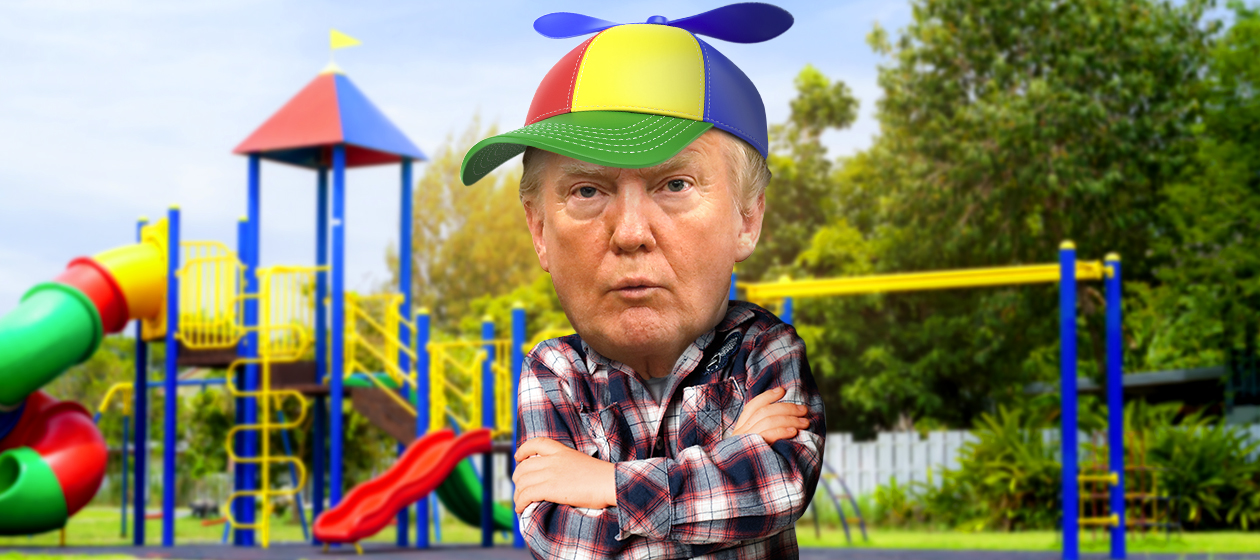Our petulant president
Donald Trump is childish, ignorant, and incompetent. That's why he's so dangerous.


A free daily email with the biggest news stories of the day – and the best features from TheWeek.com
You are now subscribed
Your newsletter sign-up was successful
With each new juicy and jaw-dropping anecdote from Bob Woodward's bombshell book Fear: Trump in the White House, which will be released next week, the truth about President Trump becomes ever more clear: He is the most unprepared and unworthy president in American history.
This is a man who reportedly called his own attorney general "mentally retarded," with the accent of a "dumb Southerner"; who felt condemning white supremacists was his "biggest f---ing mistake"; and who rather casually mused about want to "f---ing kill" Syria's Bashar al-Assad. (Trump, of course, says the whole book is full of "made up frauds, a con on the public.")
This much is clear: Almost every day President Trump violates a different norm or governing procedure. Whether it's contemplating a pardon that hasn't gone through the normal process or weighing in on policy because he saw something on Fox News, Trump routinely ignores decades or even centuries of precedents shaped by presidents of both parties.
The Week
Escape your echo chamber. Get the facts behind the news, plus analysis from multiple perspectives.

Sign up for The Week's Free Newsletters
From our morning news briefing to a weekly Good News Newsletter, get the best of The Week delivered directly to your inbox.
From our morning news briefing to a weekly Good News Newsletter, get the best of The Week delivered directly to your inbox.
Each time this happens, the left, and some on the right, react with alarm. They correctly observe that most of the safeguards in our democracy owe to norms and traditions, not legal barriers. They also point to ominous parallels from the past when democracy collapsed, replaced by dangerous authoritarians or fascists.
But these warnings miss something crucial: More evidence points to Trump being a petty, woefully unprepared person than a budding authoritarian with a master plan. Rather than trying to crush democracy, he is just trying to run the country as he ran his family company.
This doesn't make Trump any less bad or less dangerous, but understanding and acknowledging this difference is critical to persuading those Americans who have doubts about Trump, but don't hate him, of the danger he poses. And winning over these voters is crucial to electing Democrats in 2018 and Trump's eventual challenger in 2020.
Norms and governing traditions mean little to Trump.
A free daily email with the biggest news stories of the day – and the best features from TheWeek.com
He has demonstrated it repeatedly. In his first week in office, he enacted a travel ban without adequately consulting the requisite agencies and departments, leading to chaos and legal smackdowns. Months later, he pardoned Sheriff Joe Arpaio, who had been convicted of violating a court order, without consulting with the Justice Department or following the procedure for pardons abided by his predecessors. He's also blatantly ignored obstruction of justice statutes, persistently tweeting things about the Russian investigation, violated ethics rules, exposed classified information, and, just last week, refused for a time to lower the flag over the White House to honor the late John McCain because of petty personal animosity. The list goes on.
Trump's disregard for norms and protocols has unquestionably weakened our democracy, fractured relations with allies, and led to a series of poor, even cruel actions that have morally stained the country while harming millions.
This behavior has also produced endless warnings about the autocratic tendencies lurking in Trump's actions and diatribes. A Google search for "Trump" and "authoritarian" returns a whopping eight million results alone.
But while understandable, these warnings miscomprehend Trump's essence and motivations.
He might seem like a despot, but above all he's acting like what he is: a man whose work experience consists of running a family-owned business and being the star of his own television show. In these environments, no one told Trump "no," he could fire anyone who crossed him, and there were no constraints on his authority. Whatever impulse struck him, he could act upon.
The presidency should be a totally different beast, with far more constraints dictating behavior. And it would — if Trump understood the presidency. But he is woefully ill-informed thanks in part to his disinterest in briefings or preparation.
He bristles at any advice that tries to temper his whims. After all, he heard countless warnings during the 2016 campaign that ignoring norms would provoke disaster only to score a stunning victory — reinforcing his instinct to do things his way.
This toxic combination means that, as an anonymous senior administration official wrote in The New York Times this week, "meetings with him veer off topic and off the rails, he engages in repetitive rants, and his impulsiveness results in half-baked, ill-informed, and occasionally reckless decisions that have to be walked back."
It is this ignorance, incompetence, and unwillingness to rely on expertise — not a sinister intent to undermine democracy — that drive Trump's worst tendencies.
If Trump is admittedly dangerous, why does it matter that admonitions about the risk he poses get his motives wrong or oversimplify the situation? Because these warnings come off as hysterical to the many Americans who are skeptical of Trump, but don't accept the darkest views of him. And that risks them tuning out Trump critics.
To these Americans, Trump may be a lot of negative things: boorish, petulant, even foolish. But they simply don't see him as a budding dictator. And they're probably right.
Their opinions also matter because it is these voters who will determine the fate of the Republican congressional majorities in November, as well as Trump's eventual political fate. They must be convinced of the danger that Trump poses, and the best shot of prosecuting that case is through making the more believable — and equally damning — case: Trump has proven utterly incapable of doing the job, with potentially catastrophic consequences.
That's the strongest case for constraining him over the next two years and replacing him in 2020.
Brian Rosenwald is a Resident Senior Fellow at the Robert A. Fox Leadership Program at the University of Pennsylvania, co-editor of Made by History at the Washington Post, and author of Talk Radio's America, forthcoming from Harvard University Press in 2019.
-
 Crisis in Cuba: a ‘golden opportunity’ for Washington?
Crisis in Cuba: a ‘golden opportunity’ for Washington?Talking Point The Trump administration is applying the pressure, and with Latin America swinging to the right, Havana is becoming more ‘politically isolated’
-
 5 thoroughly redacted cartoons about Pam Bondi protecting predators
5 thoroughly redacted cartoons about Pam Bondi protecting predatorsCartoons Artists take on the real victim, types of protection, and more
-
 Palestine Action and the trouble with defining terrorism
Palestine Action and the trouble with defining terrorismIn the Spotlight The issues with proscribing the group ‘became apparent as soon as the police began putting it into practice’
-
 The billionaires’ wealth tax: a catastrophe for California?
The billionaires’ wealth tax: a catastrophe for California?Talking Point Peter Thiel and Larry Page preparing to change state residency
-
 Bari Weiss’ ‘60 Minutes’ scandal is about more than one report
Bari Weiss’ ‘60 Minutes’ scandal is about more than one reportIN THE SPOTLIGHT By blocking an approved segment on a controversial prison holding US deportees in El Salvador, the editor-in-chief of CBS News has become the main story
-
 Has Zohran Mamdani shown the Democrats how to win again?
Has Zohran Mamdani shown the Democrats how to win again?Today’s Big Question New York City mayoral election touted as victory for left-wing populists but moderate centrist wins elsewhere present more complex path for Democratic Party
-
 Millions turn out for anti-Trump ‘No Kings’ rallies
Millions turn out for anti-Trump ‘No Kings’ ralliesSpeed Read An estimated 7 million people participated, 2 million more than at the first ‘No Kings’ protest in June
-
 Ghislaine Maxwell: angling for a Trump pardon
Ghislaine Maxwell: angling for a Trump pardonTalking Point Convicted sex trafficker's testimony could shed new light on president's links to Jeffrey Epstein
-
 The last words and final moments of 40 presidents
The last words and final moments of 40 presidentsThe Explainer Some are eloquent quotes worthy of the holders of the highest office in the nation, and others... aren't
-
 The JFK files: the truth at last?
The JFK files: the truth at last?In The Spotlight More than 64,000 previously classified documents relating the 1963 assassination of John F. Kennedy have been released by the Trump administration
-
 'Seriously, not literally': how should the world take Donald Trump?
'Seriously, not literally': how should the world take Donald Trump?Today's big question White House rhetoric and reality look likely to become increasingly blurred
